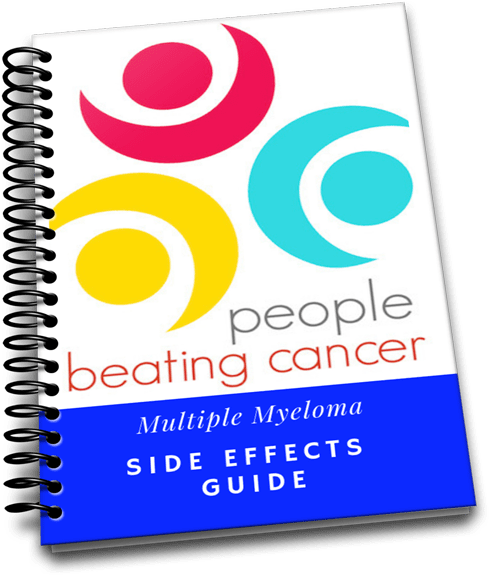
Recently Diagnosed or Relapsed? Stop Looking For a Miracle Cure, and Use Evidence-Based Therapies To Enhance Your Treatment and Prolong Your Remission
Multiple Myeloma an incurable disease, but I have spent the last 25 years in remission using a blend of conventional oncology and evidence-based nutrition, supplementation, and lifestyle therapies from peer-reviewed studies that your oncologist probably hasn't told you about.
Click the orange button to the right to learn more about what you can start doing today.
- You are here:
- Home »
- Blog »
- Multiple Myeloma »
- Surviving Multiple Myeloma- Counseling as Therapy
Surviving Multiple Myeloma- Counseling as Therapy

Mind-Body Therapies are Just as Important to Multiple Myeloma Survivors as Conventional Therapies Such as Chemotherapy and Radiation
If you are surviving multiple myeloma (patient or survivor) you understand chemoradiation therapy’s physical side effects. Most of us lose our hair during chemo. Most of us become fatigued, loose our appetite, can’t sleep, etc
You may even have experience with some of the long-term side effects such as chemo brain, cataracts, blood clots or peripheral neuropathy. But have you ever wondered about the mental side effects of surviving multiple myeloma?
Consider counseling as therapy. I’ve been surviving multiple myeloma since my diagnosis in early 1994. I can assure you that counseling as been an integral part of surviving multiple myeloma.
I didn’t consider my mental side effects of my diagnosis and extensive MM treatment for about 5-6 years after my active therapies ended. While I reached complete remission from my MM, I continued to experience mental side effects such as:
- fear of relapse,
- PTSD,
- anxiety, others.
I came to realize that treating my emotional and mental health was every bit as important to my cancer survival and quality-of-life as managing my physical health. I decided to see a psychologist to treat my mental health.
I found a local professional and got in the habit of going to her office once a week for my therapy.
At the time of my appointments with my Psychologist, it never occurred to me that I didn’t have to spend the time to travel to and from my therapist’s office each week. At the time of my counseling/therapy, online communication hadn’t really been developed yet. I wish that therapists were available online for me at the time.
Through PeopleBeatingCancer.org, I’ve learned how important online support for MM patients, survivors and caregivers can be. If you’re interested in therapist jobs, counseling jobs or learning more about BetterHelp.com, please follow the link.
The article linked below identifies some of the psychological side effects of living with cancer. Psychological side effects that cancer survivors need to identify and heal.
If you’s like to learn more about therapies to manage your cancer, scroll down the page, post a question or comment and I will reply to you ASAP.
Hang in there,
Thanks
David Emerson-
- Long-term MM survivor
- MM Cancer Coach
- Director PeopleBeatingCancer
Recommended Reading:
- Healing Chemobrain
- A Long-term Cancer Survivor’s Diet, Nutrition Plan-
- Inflammation, Chemotherapy, Cardiovascular Risks, Fibrinogen and the Cancer Survivor
Adult Cancer Survivors at Increased Risk of Psychological Distress
“As more individuals survive cancer, it is important to understand how cancer and cancer therapies affect long-term quality of life and psychological adjustment.”
There are over 14 million cancer survivors in the US today (2015). This number will increase by about 1 million cancer survivors annually. Identifying the mental and physical problems may help us manage them- helping us to live better, longer lives.
“After adjustment for other clinical and socio-demographic variables, long-term survivors who were younger, were unmarried, had less than a high school education, were uninsured, had more co-morbidities or had difficulty performing instrumental activities of daily living were more likely to experience serious psychological distress…”
A cancer diagnosis is always difficult. However, according to this study, the older you are if you are diagnosed with cancer, the better off you are. As we have discussed many times on PeopleBeatingCancer, having a caregiver helps in many ways. I have always believed that education helps understand the many complicated issues of cancer. Chemo brain, cataracts, nerve damage, irritable bladder, chronic A-Fib, chronic blood clot (some of my side effects) pain of any kind-all of these can make it difficult to live with cancer.
“Cancer diagnosis and treatment can produce delayed detrimental effects on physical health and functioning such as secondary cancers, cardiac dysfunction, lung dysfunction, infertility, neurological complications and neurocognitive dysfunction,” they write. “A cancer history can also affect social adaptation, employment opportunities and insurance coverage. Adjusting to these functional and life limitations may create long-term psychological stress.”
PBC is dedicated to identifying the physical side effects caused by chemotherapy. But I never have talked about identifying psychological side effects like social adaptation, employment opportunities and insurance coverage. By identifying who is at risk and what they may be at risk for may help to identify ways to heal the psychological issues.”
Mind-Body Therapies: Evidence and Implications in Advanced Oncology Practice
“The aim of this article is to acquaint the reader with common mind-body modalities (meditation/mindfulness-based stress reduction, relaxation therapy, cognitive-behavioral therapy, counseling, hypnosis, biofeedback, music therapy, art therapy, support groups, and aromatherapy) and to examine important evidence in support of or against their clinical application…”


